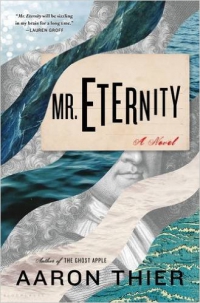
Published by Bloomsbury USA on August 9, 2016
“The truth is what happens. The world is only what it is.” So says Maria, a character in Mr. Eternity. But understanding the truth, understanding what happens (or what happened in the past, or what will happen in the future) is the problem. History cycles -- nations die and rebuild, slavery comes and goes -- but what we learn from the past is even less than what we learn from the present, hampering our ability to build a better future. That’s one of many lessons that might be taken from Mr. Eternity, an odd, sprawling, very funny account of a very long life.
Mr. Eternity takes place in several time periods. The story that unfolds in each period is related by a different narrator, each with a distinct voice. Although a few characters seem to appear in more than one period, one man links the stories. He is known by several similar names, including Daniel Defoe. He may or may not be the same Daniel Defoe who wrote Robinson Crusoe, although he has been in many shipwrecks. Defoe searches through the centuries for the treasure of Anakitos and for his lost love, Anna Gloria. It is a quest worthy of Don Quixote, to whom the novel expressly alludes.
The story in 1560 is narrated by Maria, an indigenous woman in the Amazon rainforest. Maria is thought to be from El Dorado, the legendary city of gold. Daniel de Fo plans an expedition to find El Dorado, taking Maria along as translator. He is accompanied by Spanish soldiers on a mission to conquer the land for Spain. Maria describes her observations of the explorers, and her own adventures, with wry detachment.
The narrator in 1750, an old man using the name John Green, adds a good measure of humor to the stories he tells. The stories generally concern Dr. Dan, who practices a kind of fraudulent medicine on a plantation in the Bahamas.
Equally engaging is the narrator in 2200, who works as Old Dan’s helper in exploring life in the parts of the United States that aren’t underwater. A number of vague disasters caused half the world to end between 2016 and 2200. The narrator is enthralled by Old Dan’s stories of snow and antibiotics and “streamy media” other relics of the past that the narrator doesn’t quite understand.
In 2500, the narrator is a woman whose father has declared a five year remodernization plan for St. Louis, which will henceforth be known as the Reunited States. Her father makes Daniel Defoe the Vice-Secretary of Remodernization, since Defoe “carried in his mind the whole accumulated knowledge of history.” Unfortunately, that knowledge is a bit scrambled.
The narrator in 2016 is a former graduate student who travels with a friend to Key West on the pretext of making a documentary about an old sailor who lives in a boat that was blown inland during a storm. The batty old sailor, of course, is Defoe, a/k/a “the ancient mariner.”
Defoe’s claim to have lived “in a town called La Mancha” suggests that he has something in common with Don Quixote, particularly in the confusion of reality and fantasy. As he ages, Defoe’s memories become increasingly twisted, making his stories all the more amusing. He often describes killing Magellan in the Battle of Mactan. He asserts that there were there were herds of wild camels in St. Louis when the Lewis and Clark expedition began, but he is probably confusing those with the specially bred dairy camels that went wild in later years.
Mr. Eternity might be read as an allegory of aging (nobody remembers how they got old, Defoe says, it just happens). It can also be read as a parable about finding things of value when everything is falling apart (including sunsets and pineapples), of beginning a new life in defiance of a world that always seems to be ending. Or as a lesson in living as the person you are, rather than the person you are not. It might best be read as a story about stories, including love stories, a reminder that love can be confusing and difficult to recognize but that it is worth pursuing, even when mankind is standing on an eternal precipice of disaster.
RECOMMENDED